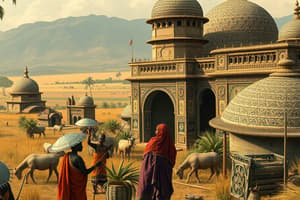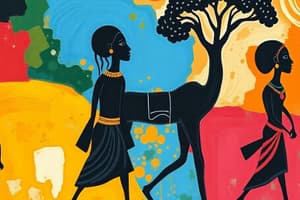Podcast
Questions and Answers
Where did Bantu-speaking farmers migrate from around 2000-1500 BCE?
Where did Bantu-speaking farmers migrate from around 2000-1500 BCE?
Central Africa
What type of agriculture did Bantu-speaking farmers practice?
What type of agriculture did Bantu-speaking farmers practice?
Subsistence agriculture
What was the significance of ironworking in Bantu-speaking farmers' economy?
What was the significance of ironworking in Bantu-speaking farmers' economy?
Allowed for tool production, hunting, and warfare
How were Bantu-speaking farmers' villages organized?
How were Bantu-speaking farmers' villages organized?
What was the significance of elders in Bantu-speaking farmers' society?
What was the significance of elders in Bantu-speaking farmers' society?
What developed from the Proto-Bantu language?
What developed from the Proto-Bantu language?
What was central to Bantu-speaking farmers' worldview?
What was central to Bantu-speaking farmers' worldview?
What was the impact of Bantu-speaking farmers on the region's landscape?
What was the impact of Bantu-speaking farmers on the region's landscape?
Flashcards are hidden until you start studying
Study Notes
Migration and Settlement
- Bantu-speaking farmers migrated from Central Africa to Southern Africa around 2000-1500 BCE
- They brought with them new farming practices, ironworking, and language
- They settled in the region of modern-day South Africa, Lesotho, Swaziland, and Mozambique
Agriculture and Economy
- Bantu-speaking farmers practiced subsistence agriculture, growing crops such as:
- Millet
- Sorghum
- Cattle
- Sheep
- Goats
- They also developed ironworking, which allowed for:
- Tool production
- Hunting and warfare
- Trading networks were established, exchanging goods such as:
- Iron
- Salt
- Copper
Social and Political Organization
- Bantu-speaking farmers lived in small villages, often led by a chief or headman
- Villages were organized into clans, with kinship ties and shared ancestry
- Age and gender played important roles in social organization, with:
- Elders holding authority and wisdom
- Women playing key roles in agriculture and family life
Cultural and Linguistic Developments
- Bantu languages, such as Sotho and Shona, developed from the Proto-Bantu language
- Storytelling, music, and dance were important cultural practices
- Ancestor worship and spiritual beliefs were central to Bantu-speaking farmer's worldview
Impact on Southern Africa
- Bantu-speaking farmers introduced new farming practices, which transformed the region's landscape
- They displaced or absorbed indigenous hunter-gatherer populations, such as the San and Khoikhoi
- Their settlement and migration patterns shaped the demographic and cultural makeup of Southern Africa
Migration and Settlement
- Bantu-speaking farmers migrated from Central Africa to Southern Africa between 2000-1500 BCE
- They settled in modern-day South Africa, Lesotho, Swaziland, and Mozambique
Agriculture and Economy
- Bantu-speaking farmers practiced subsistence agriculture, growing crops such as millet, sorghum, and raising cattle, sheep, and goats
- They developed ironworking, which enabled tool production and improved hunting and warfare capabilities
- Trading networks were established, exchanging goods like iron, salt, and copper
Social and Political Organization
- Bantu-speaking farmers lived in small villages, led by a chief or headman
- Villages were organized into clans, with kinship ties and shared ancestry
- Elders held authority and wisdom, while women played key roles in agriculture and family life
Cultural and Linguistic Developments
- Bantu languages, such as Sotho and Shona, evolved from the Proto-Bantu language
- Storytelling, music, and dance were essential cultural practices
- Ancestor worship and spiritual beliefs were central to Bantu-speaking farmers' worldview
Impact on Southern Africa
- Bantu-speaking farmers introduced new farming practices, transforming the region's landscape
- They displaced or absorbed indigenous hunter-gatherer populations, such as the San and Khoikhoi
- Their settlement and migration patterns shaped the demographic and cultural makeup of Southern Africa
Studying That Suits You
Use AI to generate personalized quizzes and flashcards to suit your learning preferences.




